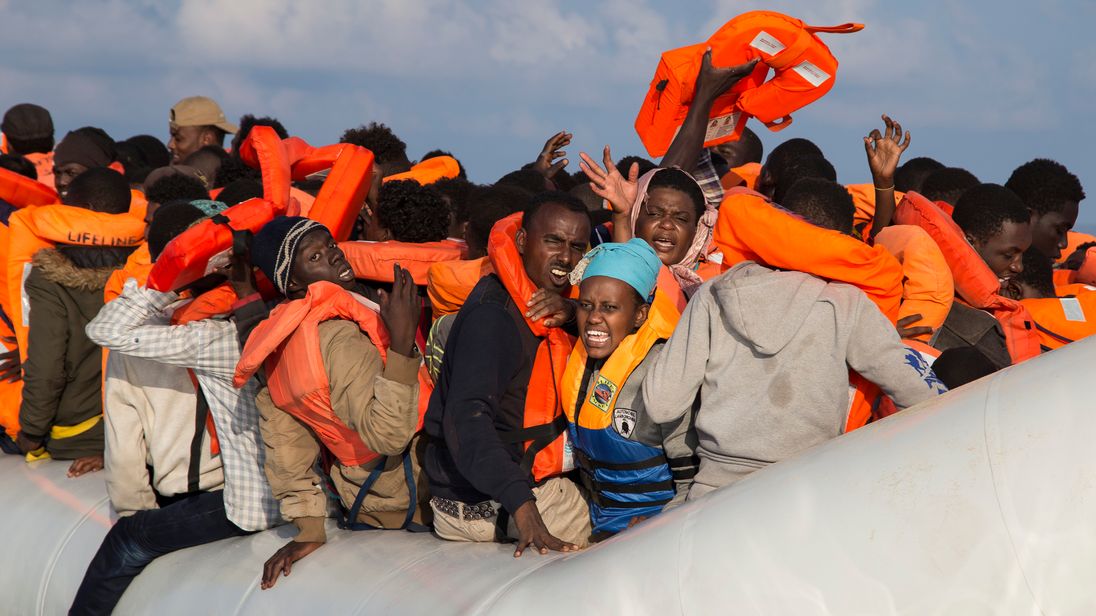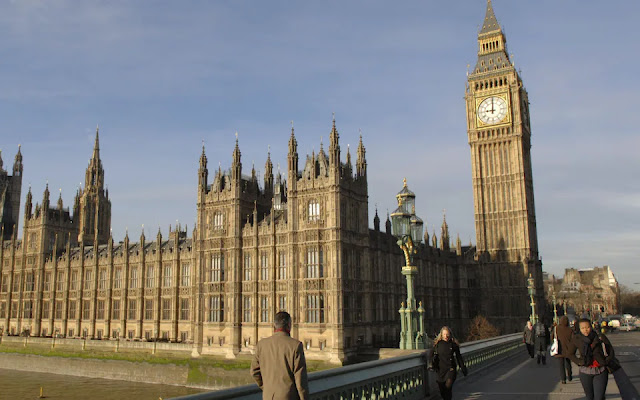THE CAMP OF THE SAINTS (Le Camp des Saints) By Jean Raspail CHAPTER THIRTY FOUR
Thirty-four
At midnight, as Saturday passed into Sunday, the first minute of Easter, the day of the Resurrection, a great noise was heard along
the coast, somewhere between Nice and Saint-Tropez. The prows of ninety-nine ships plunged headlong onto the beaches and between
the rocks, as the monster child, waking from his cataleptic sleep, let out a triumphant cry. Throughout the whole day that followed, and
part of the night, nothing stirred on board those ships. Nothing, that is, but the forest of black, waving, snakelike arms, upraised by the
thousands; the corpses thrown into the sea and washed in by the waves; and the myriad mouths, intoning, in almost a whisper, an endless
singsong chant blown ashore on the wind …
At about ten-thirty that night, the national chain broadcast its nth special bulletin of the day. Each time, as the announcer read
through the news, his voice would grow more and more concerned, as if he were reading reports of his own declining state of health and
impending demise:
“The President of the Republic has been meeting all day at the Élysée Palace with government leaders. Also present, in view of the
gravity of the situation, are the chiefs of staff of the three branches of the armed forces, as well as the heads of the local and state police,
the prefects of the departments of Var and Alpes-Maritimes, and, in a strictly advisory capacity, the papal nuncio, and most of the
Western ambassadors currently stationed in the capital. At present the meeting is still in progress. A government spokesman, however,
has just announced that this evening, at about midnight, the President of the Republic will go on the air with an address of utmost
importance to the nation …”
It was just at that moment, in fact, that the President was bringing the meeting to a close with remarks such as these, more or less:
“For almost ten hours now I’ve listened to what you’ve all had to say. You two, for instance …” (He turned toward the prefects.)
“You’ve filled my head with your mad plans to welcome that mob, with your lists and lists of places to house them. I’ve sat through
your babble about setting up work camps to ‘weather the storm.’ Tomorrow, if not sooner! And I know that you don’t believe a word of
what you’re saying. No one asked you to come here. You left your posts down south to come running where it’s safe. Safe for you, and
your families, and above all your precious conscience! Oh no, they’ll never point a finger at you! Well, I’ll tell you, my friends. You’re
fired! I’m relieving you of your duties, as they say. Not that it matters. I’m just getting a head start. By tomorrow, when all hell breaks
loose, there won’t be many governmental duties left, if any. … And you! Our heroes! …” (He turned to the chiefs of staff.) “You have
the gall to show me your maps and play me your make-believe war, with your phantom divisions and your paper brigades! Do you take
me for a Hitler, raving mad in his Berlin bunker? Don’t you know that of the two hundred thousand men sent south in the last two days
and a half, only twenty thousand ever joined their units? And not exactly glad to be there, either! The rest? Disappeared. Carried off in
the landslide. The nameless, faceless mass. An army that came from the people, you told us? Well, now it’s gone back to the people! In
Macon, they’re dancing in the barracks. In Montélimar, some regiment or other deserted to a man, with all their guns and gear, and went
into the factory slums to set up a workingman’s commune, racially mixed, for the first time ever. In Romans, a people’s committee,
Soviet style, took over the sub-prefect’s office. It’s made up of students, and workers, of course, and—yes—soldiers too. And all
without firing a shot. Not a shot! But for most of them, it’s just plain back home, back where they came from, scot-free at last. Every
man for himself. No fuss. no fanfare. So stop telling me these tales about your ‘mobilized units’ and your ‘columns on the march.’
Anyone would think you still believed in your own importance, even now, as the country goes under. Or maybe you think it will help
your careers! Well, you’re all fired too. Relieved of your duties. I’ve taken Monsieur Jean Perret’s advice, and put Colonel Dragasès in
complete control of all our security forces throughout the south, and I’ve named him chief of staff of what’s left of the army. You’re free
to go join him and swell his ranks, if you think you can take it. But you’d better bring some submachine guns with you, because fighting
men are what we need down there, nothing else! … As for you, my trusted cabinet …” (He turned to the ministers. ) “… I’ve had to put
up with you too. Sitting here, listening to you take me to task. But I understand why. I can hear your own fears and ambitions through
the flood of your meaningless drivel. Some of you, I know, have already packed your bags, already squared your consciences with your
Swiss bank accounts. All very shortsighted, I’m afraid. But still, there you are, ready to sell out, to come to terms, feathering your nests
with this contact and that. I know there’s a provisional government of sorts already in the making. Because you feel—and you’re right—
that once the inevitable happens, some kind of order will have to be imposed, and that’s where you, the experts, will save the day. You’ll
be welcomed with open arms, to assure a smooth transition. Then you’ll do your damnedest to stay in power. Who cares what kind of
power it is, as long as you wield it! Well, maybe you’ll succeed. Who knows? Others have done it before, saving what they could from a
fire that they’d helped to start themselves. And sometimes it’s worked out for the best. But that’s where we differ. I can’t resign myself
to your view of France, safe and sound, but deformed. You see, unlike you, I have no more ambitions. Thanks to Colonel Dragasès, and
Monsieur Jean Perret, and the remnants of our army, I’m still in official control for the moment. All the action will take place with them,
down south. Messieurs, I accept your resignations too, at least until tomorrow.
And as for you, my friends (He was speaking now to the Western ambassadors.)”… there’s little I can do but take note of your
heartfelt sympathy, useless though it is. Your government leaders will have plenty to chew on tonight, if the rather disturbing news from
your capitals is any indication. I know that they all have their eyes glued on France, hoping that a massacre by the country that gave us
the Rights of Man, after all, will excuse whatever horrors they may have to commit themselves. Well, you’re just like the rest of us.
You’ll have to wait for tomorrow to see how the question is answered. The one real question in the world today: whether those rights of
man that we hold so dear—of certain men, that is—can be preserved at the expense of others. I’ll let you think that one over. … And as
for you, my holy friend …” (He turned to the papal nuncio.) “… just a word or two. I can see now that Stalin was wrong, years ago,
when he smirked and asked how many divisions the Pope could muster. Your boss has no end of divisions. Though, of course, it’s true
that he’s hired a lot of extras …”
At eleven that night, after the playing of Mozart’s Second Symphony, the same announcer came back on the air:
“All still seems quiet on board the ships of the refugee fleet. A communiqué from army headquarters confirms that two divisions
have been deployed along the coast, and that three divisions of reinforcements are heading south at this moment, despite considerable
difficulty of movement. Five minutes ago, army chief of staff Colonel Dragases reported that troops under his command have begun
setting fire to some twenty immense wooden piles along the shore, in order to burn the thousands of dead bodies thrown overboard from
all the ships. … Finally, government sources note with some dismay the mass exodus of population currently under way throughout the
south. While they view this movement with concern, they do not feel justified in advising against it, given the unprecedented nature of
the situation. Army and police have been put on maximum alert to help maintain order, and to see to it that the migration does not
interfere with the flow of essential military materiel en route from the north. A state of emergency has been declared in the four
departments bordering the coast, under the command of the undersecretary, Monsieur Jean Perret, personal representative of the
President of the Republic. The army will make every effort to protect all property left behind, insofar as its other duties permit.
Government sources confirm that the President of the Republic will address the nation at midnight, tonight, with a message of grave
concern …”
And that was all. It will be remembered that old Monsieur Calguès, sitting alone by the terrace of his house—perched like an
outpost, guarding his old village, high above the sea—had asked himself if windbags, perhaps, always died without a word, since, in a
world long exposed to verbal frenzy, such terseness was most impressive. Then he had opened a book, lit up his pipe, and poured
himself another healthy glass of wine, as he waited for midnight …








Comments
Post a Comment